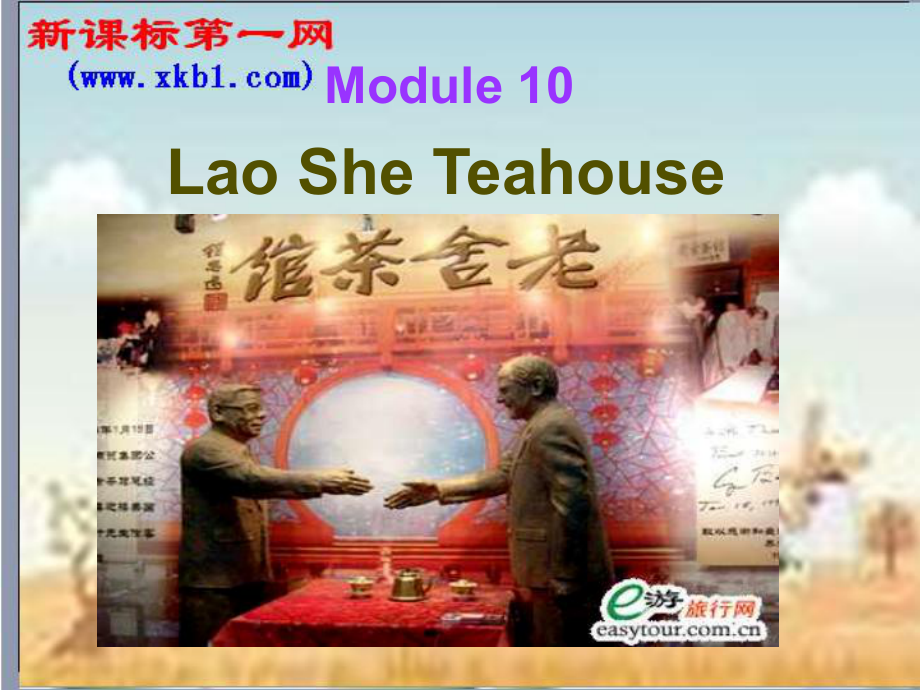《天津市葛沽第三中學(xué)八年級(jí)英語上冊(cè) Module10 Unit1 She wanted to see some Beijing Opera課件1 外研版》由會(huì)員分享��,可在線閱讀����,更多相關(guān)《天津市葛沽第三中學(xué)八年級(jí)英語上冊(cè) Module10 Unit1 She wanted to see some Beijing Opera課件1 外研版(41頁珍藏版)》請(qǐng)?jiān)谘b配圖網(wǎng)上搜索。
1����、Module 10Lao She TeahouseShe wanted to see some Beijing Opera.Unit 1main interest offeragreealmostimpossiblewhisperspecial adj. 主要的;最大的主要的�����;最大的 n. 興趣�����;愛好興趣;愛好 v. 提議�;提議;(主動(dòng)主動(dòng))給予給予 v. 同意同意 adv. 幾乎幾乎 adj. 不可能的不可能的 v. & n. 低語�����;耳語低語�����;耳語 adj. 特別的�;特殊的特別的;特殊的Words and expressions話劇話劇茶館茶館Lao She TeahouseLao She
2�、TeahouseInside of Lao She Teahouse Beijing Opera ShowTALK ABOUT THESE QUESTIONS:1. Who is Lao She?2. What do you know about Lao She?3. What works of Lao She have you read?4. Have you ever heard about his play Teahouse?5. What do you think people can do in Lao She Teahouse?老舍老舍Where do you think Ling
3、ling and Sally went, and why? Beijing Opera play teahouse1LISTEN AND NUMBER THE SENTENCES AS YOU HEAR THEM. a. “All right, you can come with us.”b. “ Would you like us to take you to Lao She Teahouse?”c. “Id like to go to the teahouse again one day.”d. “Can we come and see the teahouse?”e. “Lets sta
4����、y longer.” “OK.”f. “Were only going to stay for some tea.”1234562LISTEN AGAIN AND CHECK THE SENTENCES.1. Sally wanted to see some Beijing Opera so her parents took her there.2. Lingling likes Beijing Opera, too.3. Sally understood Beijing Opera very well.4. Teahouse is Lao Shes play.FFFTChoose the b
5、est answer for each sentence.1. Sally and _ went to Lao She Teahouse last night. A. Tony B. Lingling C. Betty 2. Sallys main interest is _. A. music B. maths C. English3. Sally _ understand Beijing Opera. A. didnt B. could C. almost didnt4. How long did they stay? They stayed for _. A. 3 hours B. 2
6����、hours C. 1 hour5. Lao She was a(n) _. A. actor B. waiter C. writerLanguage points1. Sallys main interest is music. 薩莉的主要興趣是音樂�。薩莉的主要興趣是音樂。interest 作名詞時(shí),意為作名詞時(shí)�����,意為“興趣��,趣味興趣�,趣味”。take (an) interest in對(duì)對(duì)發(fā)生興趣發(fā)生興趣places of great interest 名勝名勝interested和和interesting是形容詞����。是形容詞。interested 意為意為“感興趣的感興趣的”����,但一般,但一般不
7��、單獨(dú)使用����,常用于短語。不單獨(dú)使用��,常用于短語����。 be interested in “對(duì)對(duì)感興趣感興趣”����。Im interested in English.我對(duì)英語感興趣��。我對(duì)英語感興趣��。interesting意為意為“有趣的有趣的”����,在句子中,在句子中可以作表語��,亦可作定語��?�?梢宰鞅碚Z��,亦可作定語��。This is an interesting book.這是一本有趣的書�����。這是一本有趣的書��。2. So my parents offered to take us there. 因此����,我的父母主動(dòng)帶我們?nèi)ツ抢铩R虼?,我的父母主?dòng)帶我們?nèi)ツ抢铩?offer sb. sth. = offer sth.
8、to sb. 給某人提供某物給某人提供某物The old man offered me a nice room.這位老人給我提供了一個(gè)不錯(cuò)的房間��。這位老人給我提供了一個(gè)不錯(cuò)的房間�。 offer to do sth 提出要做某事提出要做某事She offered to buy a colour TV.她提出要買一臺(tái)彩電。她提出要買一臺(tái)彩電��。3. So my parents agreed to take us. 因此我父母同意帶我們?nèi)?����。因此我父母同意帶我們?nèi)ァ?agree to 的用法:的用法: to 作為作為動(dòng)詞不定式符號(hào)����,其后跟動(dòng)動(dòng)詞不定式符號(hào),其后跟動(dòng) 詞原形詞原形����,作����,作“同意(答應(yīng))做同
9����、意(答應(yīng))做 ”解;解����; My mother agreed to buy a new pen for me. 母親答應(yīng)給我買支新鋼筆。母親答應(yīng)給我買支新鋼筆��。 to 作作介詞�,其后跟表示介詞,其后跟表示“計(jì)劃��,計(jì)劃����,條條件,建議件����,建議”之類的名詞或代詞之類的名詞或代詞。They have agreed to our plan.他們已同意我們的計(jì)劃。他們已同意我們的計(jì)劃����。True (T) or False (F).1. Sally, her parents and Lingling went to Lao She Teahouse last night.2. Sally didnt want
10、to see Beijing Opera.3. Lingling wanted to see the teahouse.4. Sally understood Beijing Opera well.5. They had a good time.6. Betty knows Lao She very well. ANSWER THE QUESTIONS. 1. What does Sally like to do?2. Why did Sally want to go to Lao She Teahouse?3. Why did Lingling want to go to the Teaho
11�、use?She likes to listen to music.To see some Beijing Opera.To see the Teahouse. 44. How much did Sally understand?5. Why do you think they decided to stay for two hours?6. What does Sally want to do next time?7. Have Betty and Tony ever heard of Lao She?Not very much.Because it was interesting.To un
12����、derstand more.Theyve never heard of him.MATCH THE SENTENCES IN ACTIVITY 2 WITH THESE SENTENCES. 1. She offered to take us there.2. They planned to stay for some tea.3. They decided to stay longer.4. We wanted to see the teahouse.5. I hope to go there again one day.6. My parents agreed to take us.agr
13、ee decide hope offer plan wantbfedca你能總結(jié)出它們的用法嗎你能總結(jié)出它們的用法嗎?5ANSWER THE QUESTIONS. USE THE WORDS IN THE BOX. 1 Did they plan to stay for two hours?2 What is Lao She most famous for?3 Did Sally find the opera easy to understand?4 Whats Sallys interest? especially impossible main onlyNo, they only plan
14�����、ned to have some tea.Hes especially famous for Teahouse.No, she found it impossible to understand.Her main interest is music.6Speaking MAKE TRUE SENTENCES FOR YOU. 1. I have decided to _ next week.2. They offered to _ for me.3. My hope is to _ one day.4. My parents agreed to _ on Saturday.8 do sport
15��、s cook be a singer go for a walk I hope to _ bagsone day. design the most beautifulI wanted to _ _.sit in the balloon and travel all over the worldMy parents offered to _. buy a VCD player for usThey agreed to _. look after these pandas live with kinds of animals and make friends with themMy hope is
16����、 to _.I have decided to _. learn to play the guitar THINK OF AN EVENT IN YOUR LIFE AND DESCRIBE IT. I wanted toMy parents offered toThey agreed toI hope to 9課堂小測(cè)試課堂小測(cè)試一、用所給單詞的適當(dāng)形式填空����。一、用所給單詞的適當(dāng)形式填空��。1. She asked me _ (wait) for her at the cinema.2. I enjoy _ (listen) to the radio in the evening.3. It
17��、is not easy _ (learn) a foreign language.4. He agreed _ (get) someone to help us.to waitlisteningto learnto get5. I told him _ (not play) in the street.6. Would you like _ (come) with me? 7. Your task is _ (find) the cost of the hotel. 8. Should I _ (go) home now?9. Im glad _ (see) you again.10. He
18、needs _ (buy) a new bike.not to playto cometo findgoto seeto buy1. Did you have a good time last Sunday? (改為同義句)(改為同義句) Did you _ _ last Sunday?2. Lao She wrote Teahouse. He became famous.(合并為一句)(合并為一句) Lao She _ _ _ Teahouse.二�����、按要求進(jìn)行句式轉(zhuǎn)換�����。二�、按要求進(jìn)行句式轉(zhuǎn)換。enjoy yourselfwasfamousfor3. It is possible for us to finish the work in three hours.(改為否定句)(改為否定句) It _ _ for us to finish the work in three hours.4. Tourists need to wear warm clothes in winter.(改為否定句)(改為否定句) Tourists _ _ to wear warm clothes in winter.is impossibledontneedHomeworkFinish Exercise 1 on page 148.
 天津市葛沽第三中學(xué)八年級(jí)英語上冊(cè) Module10 Unit1 She wanted to see some Beijing Opera課件1 外研版
天津市葛沽第三中學(xué)八年級(jí)英語上冊(cè) Module10 Unit1 She wanted to see some Beijing Opera課件1 外研版

